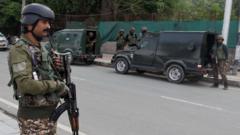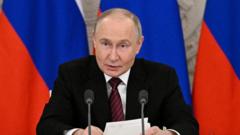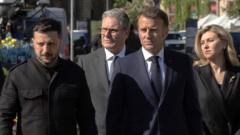The recent ceasefire agreement between India and Pakistan, brokered with significant US involvement, has temporarily eased tensions following days of military clashes. Analysts note both countries have exchanged accusations, raising concerns about the ceasefire's long-term durability.
US Mediation Pulls India and Pakistan Back from Escalation

US Mediation Pulls India and Pakistan Back from Escalation
Amid rising tensions, US mediators played a crucial role in facilitating a ceasefire between India and Pakistan, though the agreement may face challenges ahead.
In a surprising development on Saturday, US President Donald Trump announced on social media that India and Pakistan had reached a "full and immediate ceasefire" after four days of intense cross-border hostilities. The agreement was highly anticipated amid fears of a potential full-blown conflict between the two nuclear-armed neighbors. Behind the scenes, US mediators utilized diplomatic backchannels and engaged regional players to navigate the escalating tensions, experts assert.
However, the ceasefire's fragility became apparent shortly after it was declared. India and Pakistan quickly exchanged accusations regarding ceasefire violations, highlighting the precariousness of the peace deal. India accused Pakistan of "repeated violations," while Pakistan countered that its forces were exercising "responsibility and restraint."
The spike in tensions came on the heels of a deadly militant attack in Indian-administered Kashmir, which had resulted in 26 tourist casualties. This prompted India to execute airstrikes in Pakistan and Pakistan-administered Kashmir, leading to escalating retaliatory actions, including aerial clashes and artillery fire. Both nations reported inflicting severe damage on each other's military capabilities.
Experts believe that the pivotal moment in de-escalation involved a phone call from US Secretary of State Marco Rubio to Pakistani Army Chief Asim Munir, which may have acted as a crucial intervention. Tanvi Madan, a senior fellow at the Brookings Institution, noted that several countries, including the UK and Saudi Arabia, were also engaged in diplomatic efforts to mitigate the situation. Pakistani Foreign Minister Ishaq Dar indicated the involvement of over "three dozen countries" in the diplomatic negotiations.
While past US mediation efforts have been credited with averting conflicts, some experts express skepticism regarding the US's role in this specific ceasefire. Former US Secretary of State Mike Pompeo previously claimed significant involvement in alleviating tensions during the 2019 standoff, an assertion met with some doubts from diplomats regarding its accuracy.
As tensions mounted, US Vice President JD Vance initially stated that the US would remain "hands-off," suggesting that the conflict was fundamentally none of its business. Despite this initial distance, the US eventually played a critical diplomatic role. Analysts are now considering the intricacies of the US-India relationship and whether it provided the leverage needed to facilitate the ceasefire.
Political analysts identify critical factors that contributed to the success of this ceasefire, including the pressures exerted by the US and UK, Saudi mediation efforts, and direct communication channels between the national security advisors of both countries. Despite a delicate resolution in the short term, skepticism revolves around the agreement's sustainability, with predictions it could quickly unravel due to lingering tensions and differing interpretations of the ceasefire.
Michael Kugelman, a foreign policy analyst, cautioned that the hastily brokered agreement might lack solid assurances needed at such a volatile moment. As both nations navigate the aftermath of this ceasefire, any missteps could lead to a rapid deterioration of relations once again.
However, the ceasefire's fragility became apparent shortly after it was declared. India and Pakistan quickly exchanged accusations regarding ceasefire violations, highlighting the precariousness of the peace deal. India accused Pakistan of "repeated violations," while Pakistan countered that its forces were exercising "responsibility and restraint."
The spike in tensions came on the heels of a deadly militant attack in Indian-administered Kashmir, which had resulted in 26 tourist casualties. This prompted India to execute airstrikes in Pakistan and Pakistan-administered Kashmir, leading to escalating retaliatory actions, including aerial clashes and artillery fire. Both nations reported inflicting severe damage on each other's military capabilities.
Experts believe that the pivotal moment in de-escalation involved a phone call from US Secretary of State Marco Rubio to Pakistani Army Chief Asim Munir, which may have acted as a crucial intervention. Tanvi Madan, a senior fellow at the Brookings Institution, noted that several countries, including the UK and Saudi Arabia, were also engaged in diplomatic efforts to mitigate the situation. Pakistani Foreign Minister Ishaq Dar indicated the involvement of over "three dozen countries" in the diplomatic negotiations.
While past US mediation efforts have been credited with averting conflicts, some experts express skepticism regarding the US's role in this specific ceasefire. Former US Secretary of State Mike Pompeo previously claimed significant involvement in alleviating tensions during the 2019 standoff, an assertion met with some doubts from diplomats regarding its accuracy.
As tensions mounted, US Vice President JD Vance initially stated that the US would remain "hands-off," suggesting that the conflict was fundamentally none of its business. Despite this initial distance, the US eventually played a critical diplomatic role. Analysts are now considering the intricacies of the US-India relationship and whether it provided the leverage needed to facilitate the ceasefire.
Political analysts identify critical factors that contributed to the success of this ceasefire, including the pressures exerted by the US and UK, Saudi mediation efforts, and direct communication channels between the national security advisors of both countries. Despite a delicate resolution in the short term, skepticism revolves around the agreement's sustainability, with predictions it could quickly unravel due to lingering tensions and differing interpretations of the ceasefire.
Michael Kugelman, a foreign policy analyst, cautioned that the hastily brokered agreement might lack solid assurances needed at such a volatile moment. As both nations navigate the aftermath of this ceasefire, any missteps could lead to a rapid deterioration of relations once again.





















